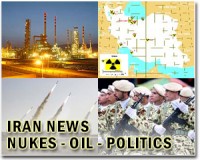 |
Vienna (AFP) Sept 6, 2010 Iran is hampering a long-running investigation into its controversial nuclear drive by vetoing the nomination of certain United Nations inspectors, the UN atomic watchdog said Monday. The International Atomic Energy Agency also said that a number of its seals had been broken on equipment at Iran's main uranium enrichment plant in Natanz. In a new restricted report, a copy of which was obtained by AFP, the IAEA complained that the "repeated objection by Iran to the designation of inspectors with experience in Iran's nuclear fuel cycle and facilities hampers the inspection process." Under its safeguards agreement with the agency, Tehran is legally allowed to reject the IAEA's list of designated inspectors. However, by actually doing so, it "detracts from the agency's capability to implement effective and efficient safeguards in Iran," the report said. Recently, the Islamic republic decided to strip two experienced inspectors of the right to monitor Tehran's nuclear activities after they reported undeclared nuclear experiments conducted by Tehran. Vetoing certain inspectors "makes our work more difficult" because new inspectors need time to gain knowledge and experience of Iran's nuclear programme, said a senior diplomat familiar with the IAEA's Iran investigation. "But it also adds to pressure on the inspectors. Some may feel unsure, they may fear being kicked out of the country" if the Iranians do not agree with their findings, the diplomat said. Iran says it barred the two inspectors recently because their reporting was inaccurate. But the IAEA stands by their findings and said it had "full confidence in the professionalism and impartiality of the inspectors concerned, as it has in all of its inspectors." The IAEA report also said it had asked Iran to explain "a number of incidents involving the breaking of seals by the operator of the FEP (fuel enrichment plant)." Iran told the agency that the breakages were "accidental". However, UN inspectors would need to conduct a so-called physical inventory verification (PIV) to determine, for example, whether any material or equipment had gone missing and the next PIV was scheduled for October, the report said. The senior diplomat said such seal breakages could occur accidentally, for example, if equipment is moved. In this case, there were four such breakages, two of which could be readily explained and verified. But the other two still had to be evaluated, the official said, noting that there are "many, many seals in that facility. Iran cannot move anything without us knowing." The report estimated that Iran has now built up a stockpile of 2,803 kilogrammes of low-enriched uranium, despite being ordered by the UN to cease all such activity until the IAEA can determine the true nature of Tehran's nuclear drive. Enrichment is at the core of the West's suspicions about the programme because it can be used not only to produce nuclear fuel, but also the fissile material for an atomic bomb. At the end of August, a total 8,856 uranium-enriching centrifuges had been installed at Natanz, up from 8,528 in May. But the number of machines being fed with UF6 (uranium hexfluoride) had declined to 3,772 from 3,936. The IAEA did not offer a possible explanation for the development. It did say, however, that Iran has now produced at least 22 kilogrammes of higher-enriched uranium, which Tehran says is for a research reactor. Iran, which had previously been enriching uranium to levels of no more than 5.0 percent in Natanz, started enriching to close to 20 percent purification in early February, ostensibly to make fuel for a research reactor in Tehran. The move was in defiance of UN sanctions and drew wide condemnation from Western countries because it brings the Islamic republic closer to levels needed to make the fissile material for a nuclear bomb. According to the new report, Iran had placed the material in a "cylinder with a capacity of about 25 kilogrammes (and) this material is under containment and surveillance."
Share This Article With Planet Earth
Related Links Learn about nuclear weapons doctrine and defense at SpaceWar.com Learn about missile defense at SpaceWar.com All about missiles at SpaceWar.com Learn about the Superpowers of the 21st Century at SpaceWar.com
 Japan slaps new financial sanctions on Iran
Japan slaps new financial sanctions on IranTokyo (AFP) Sept 3, 2010 Japan imposed new sanctions Friday against Iran, including an assets freeze on people and entities linked to its contentious nuclear programme and tighter restrictions on financial transactions. Japan also said it would suspend any new oil and gas investments in Iran, but there are no plans to restrict imports of crude oil from the Islamic republic, the fourth-biggest oil supplier to resourc ... read more |
|
| The content herein, unless otherwise known to be public domain, are Copyright 1995-2010 - SpaceDaily. AFP and UPI Wire Stories are copyright Agence France-Presse and United Press International. ESA Portal Reports are copyright European Space Agency. All NASA sourced material is public domain. Additional copyrights may apply in whole or part to other bona fide parties. Advertising does not imply endorsement,agreement or approval of any opinions, statements or information provided by SpaceDaily on any Web page published or hosted by SpaceDaily. Privacy Statement |